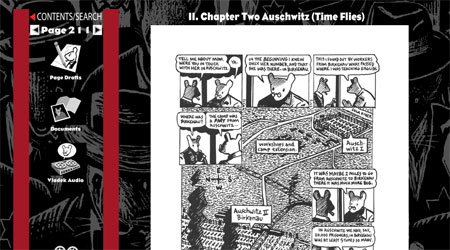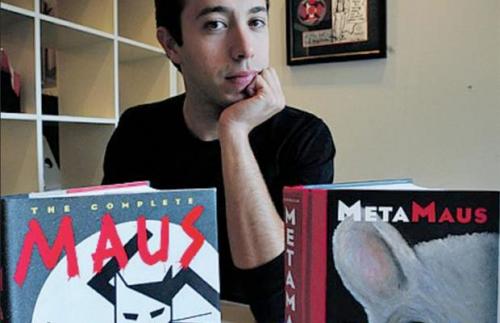MetaMaus
Back to ProjectsIn fall 2011, Pantheon Books (a division of Random House) published Meta Maus, a companion to Maus, Art Spiegelman's Pulitzer Prize-winning graphic novel about the Holocaust. Meta Maus is the story of why he wrote Maus, why he chose mice, cats, frogs, and pigs, and how he got his father to open up. The book comes with a DVD produced through the help of MDM students that features the transcripts of Spiegelman's interviews with his father, as well as illustrations, photos and other images.
(Excerpt from "Giving voice to a comics classic," Vancouver Sun, Oct 4, 2011)
 The project began in Vancouver in the summer of 2008, when Spiegelman gave a talk at the Centre for Digital Media at the invitation of the Centre's executive director, Gerri Sinclair. Sinclair suggested her students at the Centre could take on the project of breathing new life into a multimedia Maus. Spiegelman accepted the offer, and several students began working on it. Spiegelman was involved in putting together the MetaMaus book.
The project began in Vancouver in the summer of 2008, when Spiegelman gave a talk at the Centre for Digital Media at the invitation of the Centre's executive director, Gerri Sinclair. Sinclair suggested her students at the Centre could take on the project of breathing new life into a multimedia Maus. Spiegelman accepted the offer, and several students began working on it. Spiegelman was involved in putting together the MetaMaus book.
But the students couldn't simply resuscitate the Voyager CD-ROM.
"It was written in a language more obscure than Aramaic," said Spiegelman. "I had this naive notion we could just mount it on a new platform." The team of students spent two years scanning the pages of Maus and mountains of Spiegelman's sketch work.
They went back to the cassette tapes on which Spiegelman had recorded his father's story. The tapes were badly disintegrated, but the students were able to digitize them with the help of the CBC's facilities. Two years in, the project still wasn't complete.
"We had all the pieces, but couldn't put it together. It needed a producer," said Sinclair.
At that time, Ryan Nadel was not among those working on MetaMaus. After graduating in 2010, he founded his own company, 8 Leaf Digital, and was looking for a major project.
Nadel and Sinclair met up at a media conference in Stratford, Ont. She told him about the trouble with the Maus project, and Nadel offered to take it on. He flew to New York to meet Spiegelman, who was pessimistic that the project would succeed. It took a year of collaboration but they produced something that met both the artist's vision and Random House's deadline.
"Maus exists as a book for this moment in time," Spiegelman explained. "The book is seen as under threat now. The DVD respects the book as a primary source.
"If, in five years, there's nowhere to put a disc into your computer without chiselling a hole yourself, the language of this should be adaptable to the cloud," he said.
"When the day comes that Art wants it put online, we can do that," said Nadel. "And I do hope that day comes because it will be a beautiful, beautiful online experience."
Nadel said he saw MetaMaus as a chance to do something important. Holocaust survivors are dying, and their voices are disappearing. His work meant the living could listen to, and learn from, the voices of the dead.
"I had the chance to take a work like Maus and turn it into something that will endure further, to be a part of the process of preserving the oral history of the Holocaust for future generations," Nadel said.

